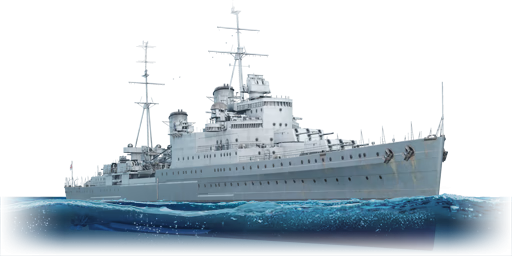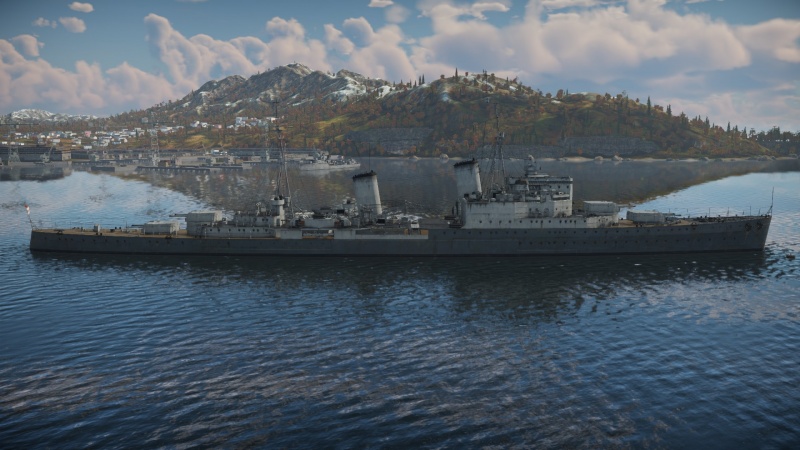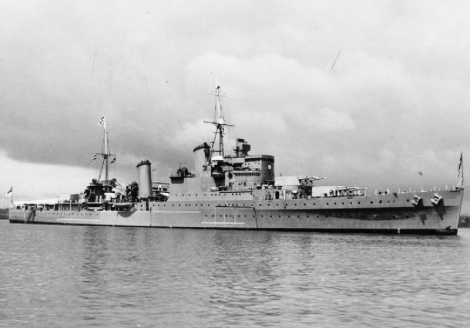Difference between revisions of "HMS Southampton"
(→Usage in battles) |
R_nminbiY_n (talk | contribs) (template) |
||
| Line 109: | Line 109: | ||
* RBJ. (2008, January 01). Light cruiser HMS Southampton (C83). Retrieved November 18, 2020, from <nowiki>https://shipshub.com/ships/180-1.html</nowiki> | * RBJ. (2008, January 01). Light cruiser HMS Southampton (C83). Retrieved November 18, 2020, from <nowiki>https://shipshub.com/ships/180-1.html</nowiki> | ||
| + | {{ShipManufacturer John Brown and Company}} | ||
{{Britain light cruisers}} | {{Britain light cruisers}} | ||
Revision as of 01:51, 28 November 2021
Contents
Description
The Town-class, HMS Southampton (C83), 1940 is a rank IV British light cruiser with a battle rating of 5.7 (AB/RB/SB). It was introduced in Update 1.89 "Imperial Navy".
General info
Survivability and armour
Talk about the vehicle's armour. Note the most well-defended and most vulnerable zones, e.g. the ammo magazine. Evaluate the composition of components and assemblies responsible for movement and manoeuvrability. Evaluate the survivability of the primary and secondary armaments separately. Don't forget to mention the size of the crew, which plays an important role in fleet mechanics. Save tips on preserving survivability for the "Usage in battles" section. If necessary, use a graphical template to show the most well-protected or most vulnerable points in the armour.
Mobility
Write about the ship's mobility. Evaluate its power and manoeuvrability, rudder rerouting speed, stopping speed at full tilt, with its maximum forward and reverse speed.
| Mobility Characteristics | |||
|---|---|---|---|
| Game Mode | Upgrade Status | Maximum Speed (km/h) | |
| Forward | Reverse | ||
| AB | |||
| Upgraded | 69 | 24 | |
| RB/SB | |||
| Upgraded | 59 | 21 | |
Modifications and economy
Armament
Primary armament
Provide information about the characteristics of the primary armament. Evaluate their efficacy in battle based on their reload speed, ballistics and the capacity of their shells. Add a link to the main article about the weapon: {{main|Weapon name (calibre)}}. Broadly describe the ammunition available for the primary armament, and provide recommendations on how to use it and which ammunition to choose.
Secondary armament
Some ships are fitted with weapons of various calibres. Secondary armaments are defined as weapons chosen with the control Select secondary weapon. Evaluate the secondary armaments and give advice on how to use them. Describe the ammunition available for the secondary armament. Provide recommendations on how to use them and which ammunition to choose. Remember that any anti-air armament, even heavy calibre weapons, belong in the next section. If there is no secondary armament, remove this section.
Anti-aircraft armament
An important part of the ship's armament responsible for air defence. Anti-aircraft armament is defined by the weapon chosen with the control Select anti-aircraft weapons. Talk about the ship's anti-air cannons and machine guns, the number of guns and their positions, their effective range, and about their overall effectiveness – including against surface targets. If there are no anti-aircraft armaments, remove this section.
Additional armament
Describe the available additional armaments of the ship: depth charges, mines, torpedoes. Talk about their positions, available ammunition and launch features such as dead zones of torpedoes. If there is no additional armament, remove this section.
Usage in battles
Leading on from the Leander, the Southampton feels like a huge overall upgrade. The main battery now consists of twelve 6-inch guns, in triple-mounted gun turrets, giving this ship a very accurate and very powerful broadside for a light cruiser. Combined with the rate of fire of 8 rounds a minute, this ship can be deadly to other cruisers when its rear guns are brought around. Even with the front two turrets, six shells will be firing off every 7.5 seconds, and with good velocity and accuracy. The Southampton also has very good armour for a British cruiser, with 114.3 mm of armour protecting the ammo racks and citadel, and 63.5 mm of armour protecting the citadel from bow-on bombardment. The main fire tower armour also improves, making the ammo on this ship tricky to hit even for 8-inch guns. The ship also upgrades to the Mk. IX torpedoes, which have good speed and great distance, giving it good anti-cruiser screening capabilities.
The Southampton does have noticeable drawbacks. Firstly, it can exclusively face heavy cruisers that can still punch through its armour. In return, its 6-inch guns with the SAP can struggle to penetrate the armour of the stronger cruisers it faces, and it can do nothing if it comes up against battleships. The Southampton's AA armament is also pretty poor. While it retains the 4-inch guns of the Leander, it loses the 20 mm cannons for close-range fire, and only carries a handfull of 40 mm 2pdr guns, and some 12.7 mm Vickers. Also, while being much heavier than the Leander, it still carries around the same number of crewmen, making it quite easy to eliminate this ship with fires and flooding.
Pros and cons
Pros:
- 12-gun broadside with good rate of fire can cause huge issues for enemy cruisers
- Very accurate guns means ranging shots are rarely necessary
- Improved armour protection, with a very strong citadel and well protected ammo racks
Cons:
- Faces heavy cruisers and battleships that can punch through its armour
- Top speed and manoeuvrability are lacking
- AA armament is pretty poor for a British ship
- Small crew size can mean fires and flooding are a huge danger
History
The HMS Southampton, pennant number 83, is a light cruiser of the Town class. Launched in 1936, she went on to see service during the Second World War. She initially served as the flagship of the 2nd Cruiser squadron of the Home Fleet, and later participated in several engagements with German vessels. She was reassigned to the Mediterranean in October of 1940. However, in January 1941, she was bombed by Italian aircraft and suffered crippling damage. As a result, she was scuttled with torpedoes from her escorts.[1]
Design and development
The Southampton was a member of the Town class, a group of light cruisers built in the 1930s. Initially intended to be built as Arethusa-class cruisers, the design was changed after the construction of the American Brooklyn-class and Japanese Mogami-class ships. The vessels were 180 metres long and displaced 11 000 tons, as they weren't regulated by the Washington naval treaty.[2] The ships carried an armament of twelve 152 mm guns in four triple turrets, a big upgrade from the six-gun Arethusas. The ships also carried numerous anti-aircraft defenses, and two triple torpedo launchers. She was capable of 32 knots (59 km/h).[2]
The HMS Southampton was laid down on November 11th 1934, and launched on March 10th 1936.[2] She was formally commissioned into the Royal Navy in March of 1937.[2]
Operational history
Following her commissioning, the Southampton entered service with the 2nd Cruiser squadron of the British Home Fleet. After the outbreak of the Second World War, she participated in the hunts for the German merchant Johannes Molkenbuhr and the battlecruisers Scharnhorst and Gneisenau. During this time, she was damaged twice; first by a 500kg bomb while she was laid up at Rosyth, and later by a German air attack off the coast of Norway.[1]
In November of 1940, Southampton sailed for the Mediterranean. She later participated in the Battle of Cape Spartivento and escorted resupply missions to Malta. However, on January 11th of 1941, she was attacked by twelve Stukas of the Luffewaffe. Hit by two bombs, the ship caught fire and suffered severe damage. With 80 sailors dead and no electrical power, the decision was made to scuttle the ship. Thus, she was sunk by four torpedoes from the cruiser Orion and a single torpedo from her sister ship Gloucester.[1]
Media
See also
Links to articles on the War Thunder Wiki that you think will be useful for the reader, for example:
- reference to the series of the ship;
- links to approximate analogues of other nations and research trees.
External links
References
Works Cited
- Helgason, G. (1995). HMS Southampton. Retrieved November 17, 2020, from https://uboat.net/allies/warships/ship/1235.html
- RBJ. (2008, January 01). Light cruiser HMS Southampton (C83). Retrieved November 18, 2020, from https://shipshub.com/ships/180-1.html
| John Brown & Company | |
|---|---|
| Destroyers | |
| Daring-class | HMS Diamond |
| Light Cruisers | |
| Emerald-class | HMS Enterprise |
| Town-class | HMS Southampton |
| Tiger-class | HMS Tiger |
| Battlecruisers | |
| Renown-class | HMS Repulse |
| Admiral-class | HMS Hood |
| Battleships | |
| Queen Elizabeth-class | HMS Barham |
| Britain light cruisers | |
|---|---|
| Emerald-class | HMS Enterprise |
| Dido-class | HMS Dido |
| Leander-class | HMNZS Leander |
| Arethusa-class | HMS Arethusa |
| Town-class | HMS Belfast · HMS Liverpool · HMS Southampton |
| Tiger-class | HMS Tiger |
| Abdiel-class* | HMS Abdiel |






